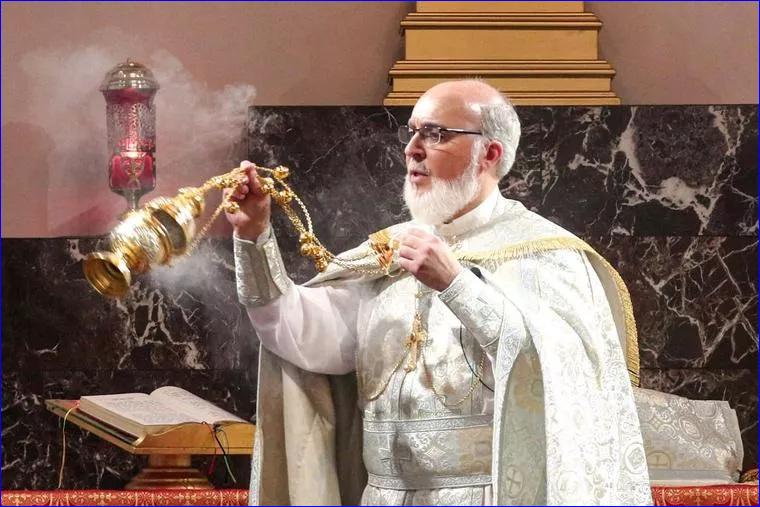


 Safin Hamid/Getty)
Safin Hamid/Getty)
Speaking at Pázmány Péter Catholic University on May 21, he testified to the strength and resilience of Christians in the Middle East. A few days earlier, he had attended the inaugural Mass of Pope Leo XIV, with whom he shares not only American nationality, but also the same birthplace, Chicago. Their first private meeting at the Vatican gave the patriarch cause to hope that the ecumenical dialogue between their two Churches would gain momentum, as he revealed in this interview with the Register.
The Assyrian Church of the East is among the world's most ancient Christian communities, with roots in Mesopotamia. Its current patriarchal seat is located in Erbil, in the Kurdistan region of Iraq. Though separated from the Catholic Church since the fifth century, it shares many essential tenets of faith and has engaged in sustained theological dialogue with Rome since the 1980s.
A Vanishing Presence in the Middle East Patriarch Awa, who will turn 50 on July 4, painted a grave picture of Christian life in Iraq and Syria, where war, persecution and neglect have devastated once-flourishing communities. He warned that Christianity is disappearing from its birthplace at an alarming rate. In Iraq, entire towns have been emptied. In Syria, the decline is even more dramatic: From an estimated 12% of the population, Christians now account for only 2% to 3%, he told the Register. . The fall of Bashar al-Assad's regime and the rise of a new Islamist-influenced government has further deepened fears among Christian minorities, who now face growing uncertainty regarding religious freedom, security and representation in public life.
"We are facing the erasure of our people and tradition in the region," he said, adding that parishes that once welcomed thousands now gather only dozens.
While Christians in the Kurdistan region enjoy relative freedom to worship, build churches and run schools, the broader context remains bleak. Across Iraq and Syria, political instability and economic hardship continue to drive Christian families into exile.
"Many of our people are now stuck in Jordan, Lebanon and Turkey, hoping to reach Australia, North America, Canada, the U.S. or Europe," the patriarch said.
Providing consistent pastoral care to these scattered communities is increasingly difficult, given the scarcity of clergy and limited resources. "We try to visit and celebrate the sacraments as often as possible," he said, "but the Church is under strain."
Western Silence -- and a Singular Ally In candid terms, Patriarch Awa criticized the indifference of Western powers. "Unfortunately, Christianity in the West has become very lethargic," he said, citing the cultural and moral upheavals of the 1960s as a turning point. Today, he warned, secularism is not neutral: It seeks to erase Christianity from public life. "Christianity made Europe what it is today. Now, Europe is turning away from that inheritance."
By contrast, the patriarch praised Hungary's commitment through the Hungary Helps program -- a government initiative supporting Christian communities in crisis around the world. "Hungary has been really exemplary," he said, highlighting its work in education, infrastructure and diplomatic engagement.
He called on Western Christians to become more conscious of their Eastern brothers and sisters. Raising awareness, he said, begins with understanding the legacy and struggles of the Eastern Churches.
Globally, the Assyrian Christian population is estimated between 3 million and 5 million. Significant diaspora communities exist in the United States, Sweden, Germany and Australia. These communities face their own challenges: maintaining faith and identity in increasingly secularized societies.
"One of our major challenges today is about staying open to integration without engaging in an assimilation that melts our identity," the patriarch said. Catechesis, youth engagement, and the continued use of Aramaic in liturgy are in his view essential to preserving that identity.
The Path to Unity This conversation took place shortly after the 30th anniversary of "The Common Christological Declaration" signed in 1994 between the Assyrian Church of the East and the Catholic Church -- a milestone in bridging centuries of division. Patriarch Awa praised the progress it enabled, noting it laid the foundation for the continuing theological dialogue between the two Churches and the restoration of mutual understanding after centuries of separation.
"We are in the third phase of our theological discussions, which focus on the constitution of our Churches, and deal with questions of communion and primacy at local, provincial and universal level," he stated, pointing to the increase in exchanges of theological students as tangible proof of the positive evolution of the ongoing dialogue.
He also noted Pope Francis' inclusion of St. Isaac the Syrian -- a seventh-century Assyrian saint -- in the Roman martyrology as a powerful symbol of mutual respect. "Unity is a gift of the Holy Spirit," he said. "We cannot force it, but we walk toward it."
Patriarch Awa met Pope Leo XIV privately in Rome shortly after Leo's installation, May 18. Though it was their first meeting, he described the new Pope as "very humble, open-minded and attentive." He expressed hope that Leo XIV would continue to strengthen bonds with the Eastern Churches -- including efforts to establish a common date for Easter, a possibility Pope Francis had endorsed in 2024.
As heads of Churches with a global mission and a common U.S. origin, Patriarch Awa said he and Pope Leo XIV were afforded early insight into the realities of Western secularism. They now stand on the world stage at a crossroad of history, marked by heightened geopolitical tensions and rising persecution of Christians -- but also by a renewed opportunity for cooperation and witness.

or register to post a comment.